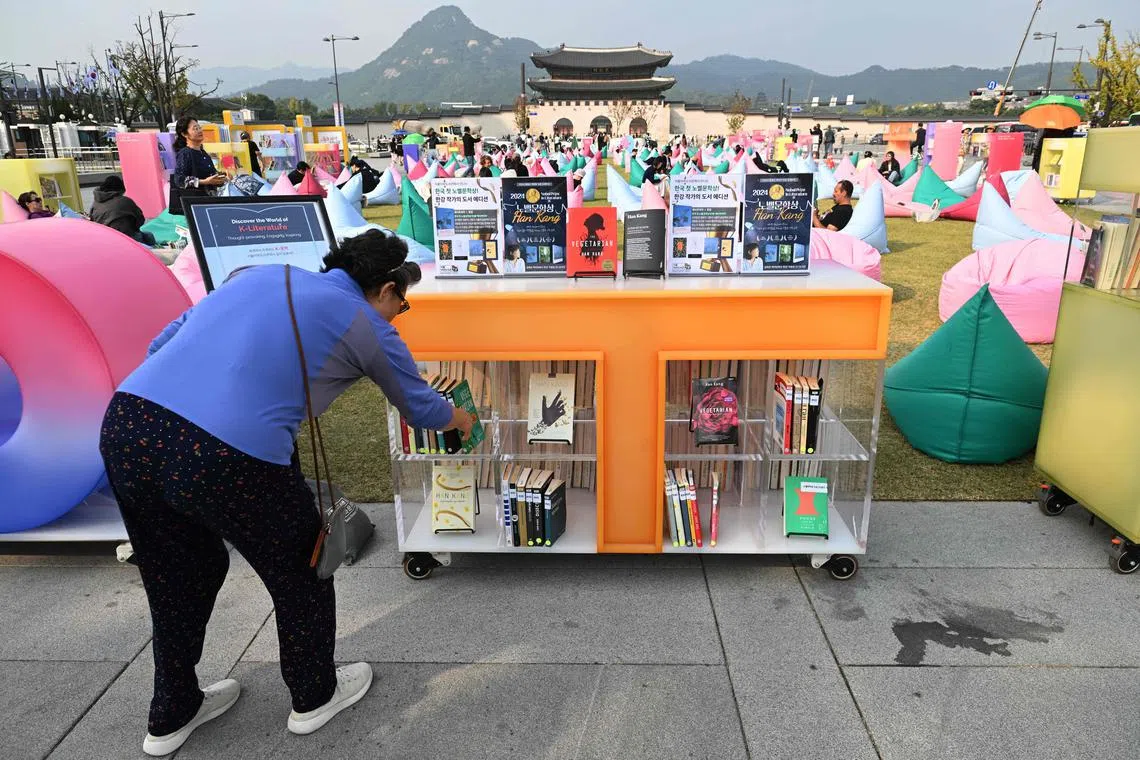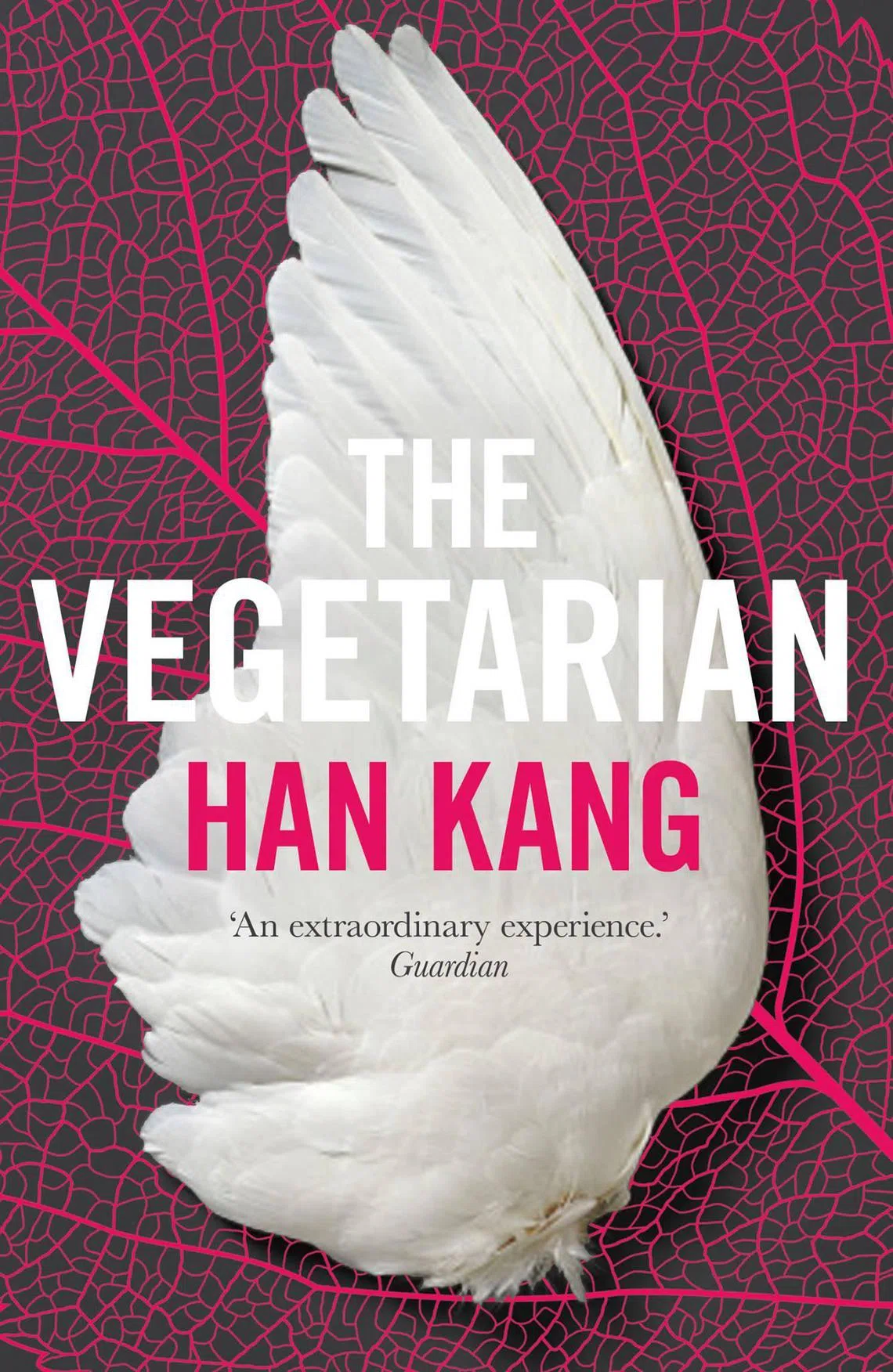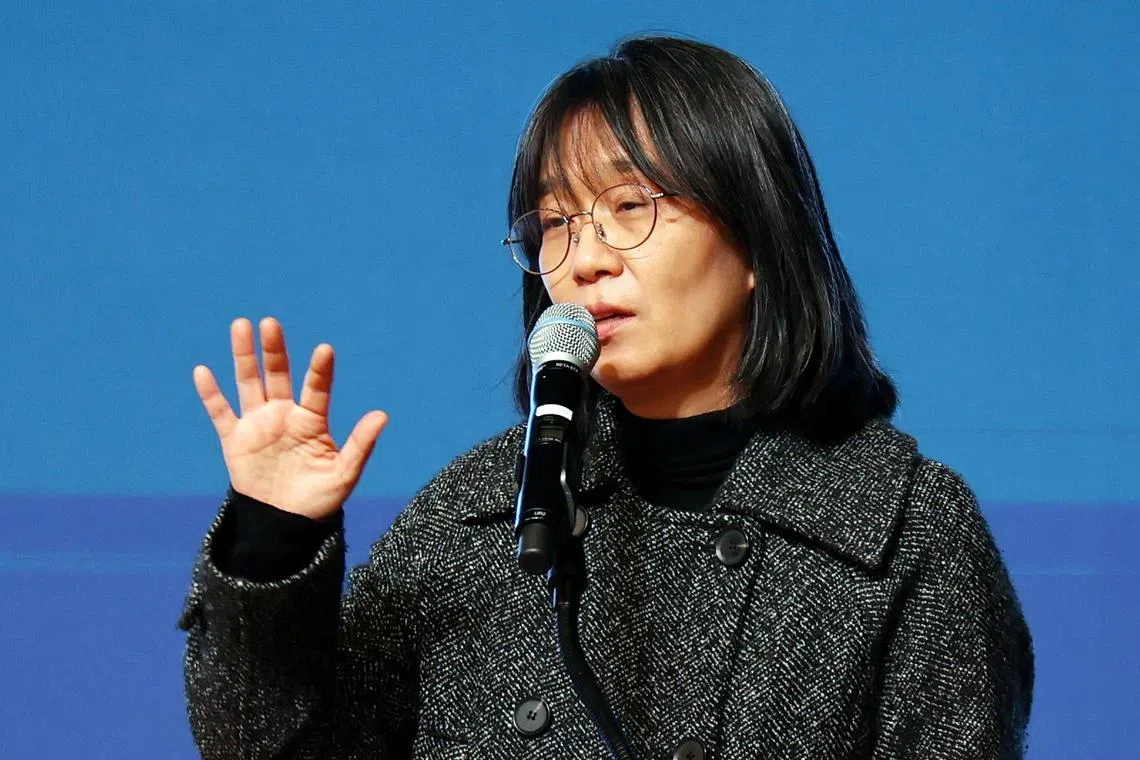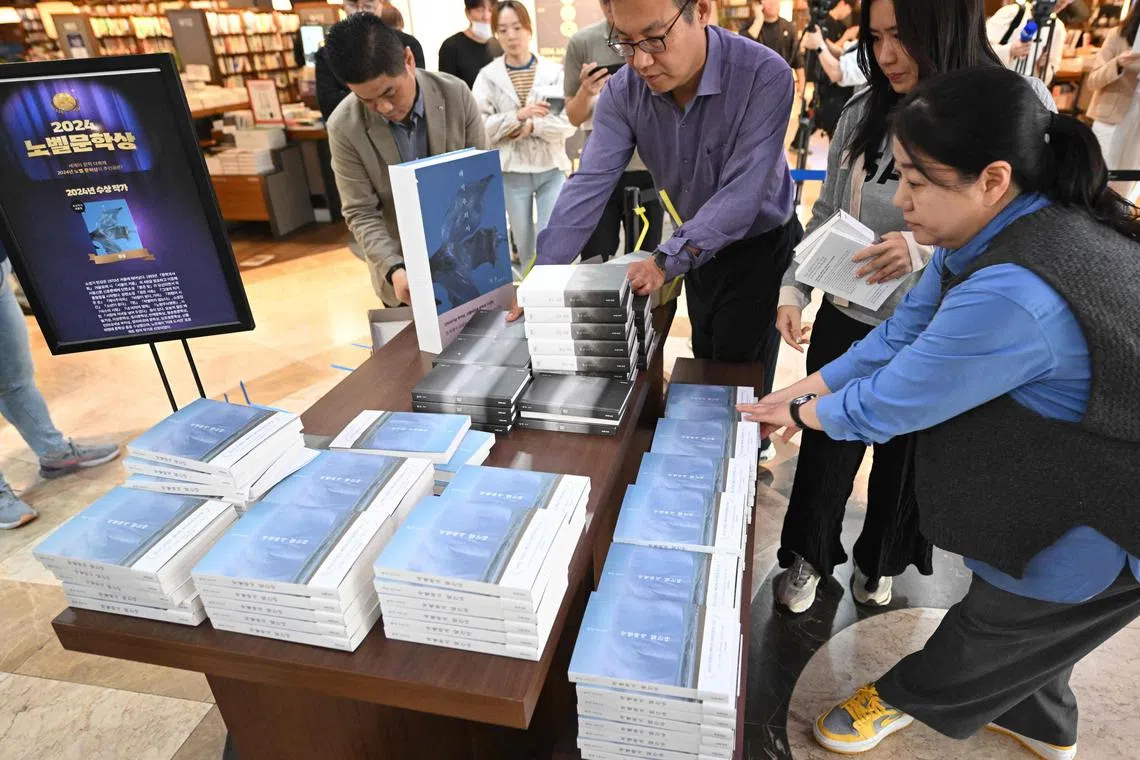‘Not just a nation of pop culture’: Han Kang’s Nobel also a win for South Korea’s literary power
Sign up now: Get ST's newsletters delivered to your inbox

South Korea has an obsession with the international recognition that comes with awards like Olympic golds and Nobel Prizes.
PHOTO: AFP
Follow topic:
TOKYO – The awarding of the Nobel Prize in literature to Han Kang on Oct 10 stands as yet another validation of the outsize soft power of the South Korean cultural juggernaut.
She is both the first South Korean and the first Asian woman to receive the Nobel,
Her achievement follows Bong Joon-ho’s best picture Oscar for Parasite (2019), as well as the broad popular success of television shows like Netflix’s Squid Game (2021 to present) and K-pop acts such as BTS and Blackpink.
The award for Han, 53, who is best known outside her home country for The Vegetarian (2007), is fitting at a time when female novelists and poets from South Korea have flourished, particularly in translation, sending a wave of works into the hands of international readers.
But while her victory was widely celebrated as a crowning cultural achievement for South Korea, what Han and these female writers represent is a form of rebellion against South Korean culture, which remains deeply patriarchal and often misogynistic.

The Vegetarian by Han Kang.
PHOTO: PORTOBELLO BOOKS
Only one of the 10 heads of the country’s Ministry of Culture, Sports and Tourism has been a woman since it assumed its current name in 2008.
Until Han’s triumph, South Korea’s male-dominated literary critics’ circles had long championed poet Ko Un as the country’s most likely and deserving Nobel candidate. Before allegations of sexual abuse surfaced against him, local reporters would gather in front of his home when the Nobel announcement was imminent.
Han never drew such crowds.
For her and other female authors in South Korea, writing is “a form of dissent and resistance”, said Bora Chung, a writer whose collection of short stories, Cursed Bunny, was published in English in 2022.
South Korea has an obsession with the international recognition that comes with awards like Olympic golds and Nobel Prizes. Until Oct 10, it had produced only one Nobel laureate: a former president, Kim Dae-jung, who won the Peace Prize in 2000 for his fight for democracy under military rule and his efforts to build reconciliation and peace with North Korea.
That Nobel and now the one for Han are deeply tied to South Korea’s tumultuous modern history, which has been marked by the division of the Korean Peninsula, a war, military dictatorship, and a long and often bloody struggle for democracy and labour rights.
In South Korea, Han is best known for Human Acts (2014), a novel about the massacre of democracy activists in Gwangju in 1980.
The government of Park Geun-hye, the conservative president of South Korea from 2013 until her impeachment in 2017, put Han on a “blacklist” of writers, artists and directors it considered unfriendly and barred from government-controlled support programmes, according to opposition lawmaker Kang Yu-jung.
The list has never been made public, but Han was blackballed because the brutal crackdown chronicled in Human Acts was carried out by a past conservative dictatorship, said Ms Kang. We Do Not Part, Han’s 2021 novel, discussed another civilian massacre that many conservative South Koreans did not want to see in public debate.
The Vegetarian, Han’s most widely read book internationally which won the 2016 Man Booker International Prize, is a chronicle of violence at a more intimate scale, of a woman oppressed in her own home.
She has said she draws inspiration in her writing from questions raised by “human violence” throughout South Korea’s history. She said her “sense of guilt” over meat consumption, a key element of The Vegetarian, was linked to the massacre in Gwangju, her home city.
Referring to her writing process for Human Acts, she said: “The feeling I had most often while writing the book was pain, an overwhelming pain. I cried almost every day when I wrote the novel.”
On Oct 11, citing violence on a broader scale, Han’s novelist father Han Seung-won, 84, told South Korean journalists that his daughter had decided not to hold a news conference to discuss the Nobel.
“She told me she did not want to celebrate at a time when people were dying every day in the wars” in Ukraine and the Middle East, he was quoted as saying when he met reporters in southwestern South Korea.

South Korean author Han Kang, winner of the 2024 Nobel Prize in Literature, making a speech in Gwangju, South Korea, in this photo taken in 2023.
PHOTO: REUTERS
In a statement released on Oct 11 by her publishers, Munhakdongne Publishing and Changbi Publishers, Han Kang said: “I am grateful for being chosen as the laureate. The amount of warm words of congratulations that poured in throughout the day like an enormous wave surprised me.
“I was first shocked at the news, and the sense of reality and emotion slowly began to sink in as I hung up the call (of the announcement).”
She also told an official of the Swedish Academy, which made the Nobel announcement: “I grew up with Korean literature, which I feel very close to. I hope this news is nice for Korean literature readers and my friends, writers.”
While Han’s work tackles heavy historical freight, it can also be seen as feminist. In The Vegetarian, the protagonist’s decision to avoid meat can be read as an act of resistance against patriarchal systems.
With women still facing discrimination in politics, the business world and the news media in South Korea, literature is an outlet where they can express their power.
“It’s one of the few spaces where you can be freed from gender,” said Krys Lee, a novelist who lives in Seoul. “You can write all of the ages and genders.”
Other female writers said they were not surprised that it was a woman now representing South Korea’s literary power on the global stage.
“The strongest voices of literature, even when it was dominated by men, came from the most oppressed,” said Euny Hong, author of The Birth Of Korean Cool: How One Nation Is Conquering The World Through Pop Culture.
“People in troubled situations or marginalised groups,” she said, “have to have a very clear and loud voice or they won’t be heard, and that has always been reflected in literature.”
Female readers have also become more powerful in the South Korean literary market in recent years, with the growing class of professional women, Lee said.
The rise of activism against sexual harassment and assault internationally and within South Korea has also created a hunger for women’s voices.
Han comes “from a certain generation of women who grew up under a patriarchal system and also a country with a modern history of violence, and I think her work speaks to that”, Lee said.
South Korea’s literary community and members of its international diaspora hope Han’s Nobel victory can draw the spotlight to books in the way that films and television shows have made South Korean stories so popular in those mediums.
Already, major South Korean bookstores have sold out her books, as sales skyrocketed and the share price of local publishers soared following her historic win.

Books by South Korean author Han Kang, who won the 2024 Nobel Prize in Literature, displayed at a bookstore in Seoul on Oct 11.
PHOTO: AFP
“Because of Korean movies first, people are recognising that Koreans are very good storytellers,” Hong said.
Han’s award “will bring this new appreciation for Korean high culture because it’s a country that’s been known for a while for producing popular culture,” Hong said.
“But it’s not just a nation of pop culture. It’s also a nation of ideas. So I think that’s sort of the revelation – ‘Oh, Korea doesn’t just make films and bands. They also have an amazing literary richness.’” NYTIMES
The Vegetarian ($19.30) by Han Kang is available at Books Kinokuniya.

